Artisans from the Land of the Rising Sun
In the Dawn’s Awakening,
the Spirit Reveals its Light
THE SWORD
In the Dawn’s Awakening,
the Spirit Reveals its Light
Ancient Culture Inherited by Japan − Delivering the Spirit of Ancient Culture to the Future.
Ancient Culture Inherited by Japan − Delivering the Spirit of Ancient Culture to the Future.
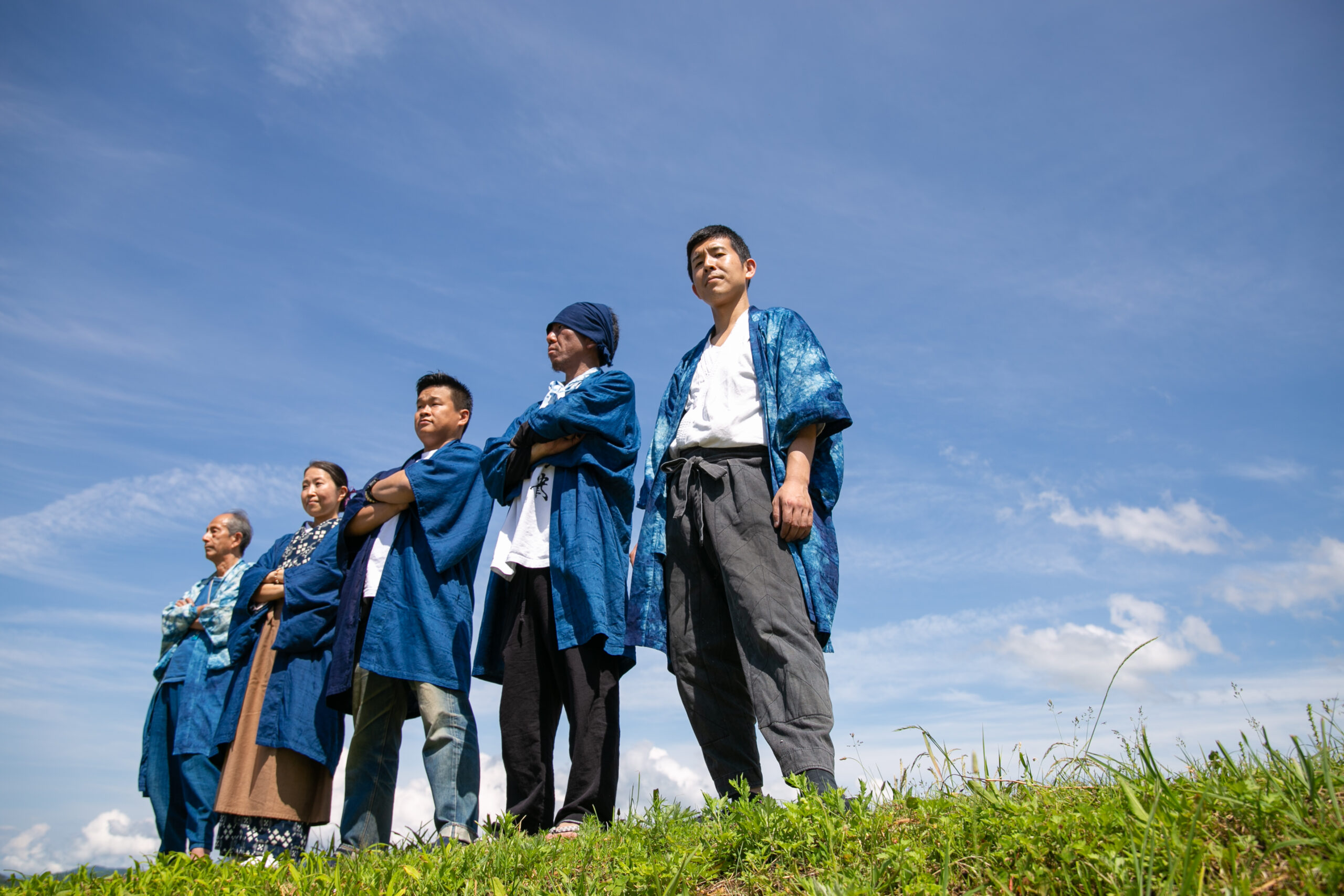
[Starring]
Kei Nezu – Japanese Swordsmith
Akio Takai – Edo-Style Carving Craftsman
Chikako Yamagishi – Nishijin Textile Artisan
Tonbiii Shimizu Yutaka – Indigo-Dyed Marugame Fan Artisan
Taihei Tsunekawa – Tatami Craftsman
Harumitsu Takaoka – Hemp Knot Artisan
Kei Nezu – Japanese Swordsmith
Akio Takai – Edo-Style Carving Craftsman
Chikako Yamagishi – Nishijin Textile
Artisan
Tonbiii Shimizu Yutaka – Indigo-Dyed
Marugame Fan Artisan
Taihei Tsunekawa – Tatami Craftsman
Harumitsu Takaoka – Hemp Knot Artisan
[Created by]
Shinichi Sawada
Director / Editor /
Cinematographer / Producer
Shinichi Sawada
Director / Editor / Cinematographer /
Producer
[Production Company]
Amenouzume Inc.
[Film Distributor]
One’s
[In Association With]
Hinomoto Project
Hinomoto Foundation for Culture
Documentary Film
2025 / 116 min / © amenouzumefilm
Trailer
Introduction
Documentary depicting the lives of six Japanese craftsmen
Since ancient times, there have been those who, with the skill and spirit of skilled artisans, create things that come to life.
They are called ‘craftsmen’, who are connected to the eight million, sharpen their physical senses and perform their work with unparalleled precision.
Today, however, people on the planet have forgotten their hearts, rely solely on visible material values and continue to consume according to their desires.
Nature has become a victim of this, ‘conflicts’ and wars have not ceased, and the planet is truly dying.
On this dawn night, six ambitious traditional Japanese craftsmen have risen up.
A story of the soul is set in motion, with the craftsmen’s creations based on the theme of ‘harmony’.
In this film, the camera follows these craftsmen over a period of two and a half years as they create things that have “life” in them.
The film also shows the craftsmen as they are, living out their “mission”.
What does it mean to live?
This documentary questions the essence of ‘life’.
Story
The objects produced by Japanese craftsmen are not mere tools.They are prayers, expressions of the soul, and records of lives passed down through time.
This documentary questions what “craftsmanship” means and what it means to “live one’s life” through the lives of six traditional craftsmen, including a swordsmith.The director spent four years following the creative journey of these craftsmen in their search for “harmony.The symbol of the film is a sword.
Since ancient times, swords have been offered to the gods not as weapons but as symbols of prayer.The story begins with a blacksmith, Mr. Nezu, who forges a sword in order to revive the sword of prayer in the modern age. The steel blade is imbued with a wish for harmony.
The craftsmen eventually come face to face with reality and conflict. Setbacks and rebirths. The human drama echoes the story of the sword, and the lives of the “thing” and the “person” begin to resonate with each other. This film is not merely a record of traditional culture, but a question to the hearts of modern people. What have we lost in exchange for convenience? And what will the skills and spirit still handed down today bequeath to the future? The challenge and determination of craftsmen spun in unprecedented visual beauty.
What their blades open up may be the future of our spirit to which we should return.
CAST
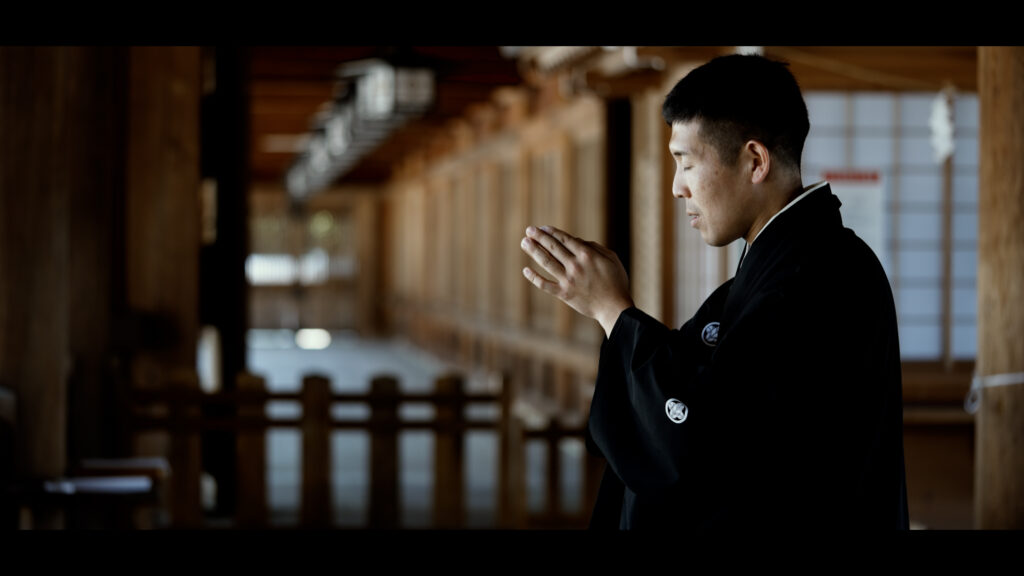
Kei Nezu,
[Japanese Swordsmith]
During his high school years, he visited a museum where he encountered the national treasure sword “Meibutsu Kanze Masamune,”
which inspired him to pursue swordsmithing.
He has received numerous awards in the world of sword-making, including prizes from the Minister of Economy,Trade and Industry and the Minister of Education, Culture, Sports, Science and Technology.
He crafts swords that protect their owners and carve a path forward.
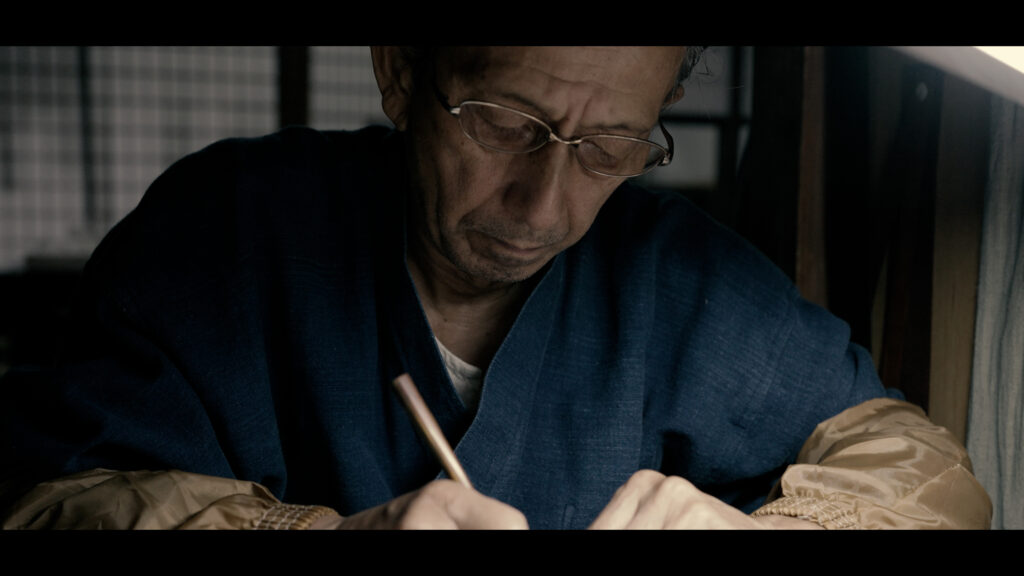
Akio Takai
[Edo-Style Carving Craftsman]
from Shirako, Suzuka City, Mie Prefecture.
Although he once left the family business of engraving, he returned to the craft after realizing the critical situation facing
engravers. He took up the chisel again to pass on his skills to the next generation. Based in the Toao workshop,
he passionately promotes artisan activities through workshops across Japan and classes in elementary schools.
This year (2025), he turns 75.
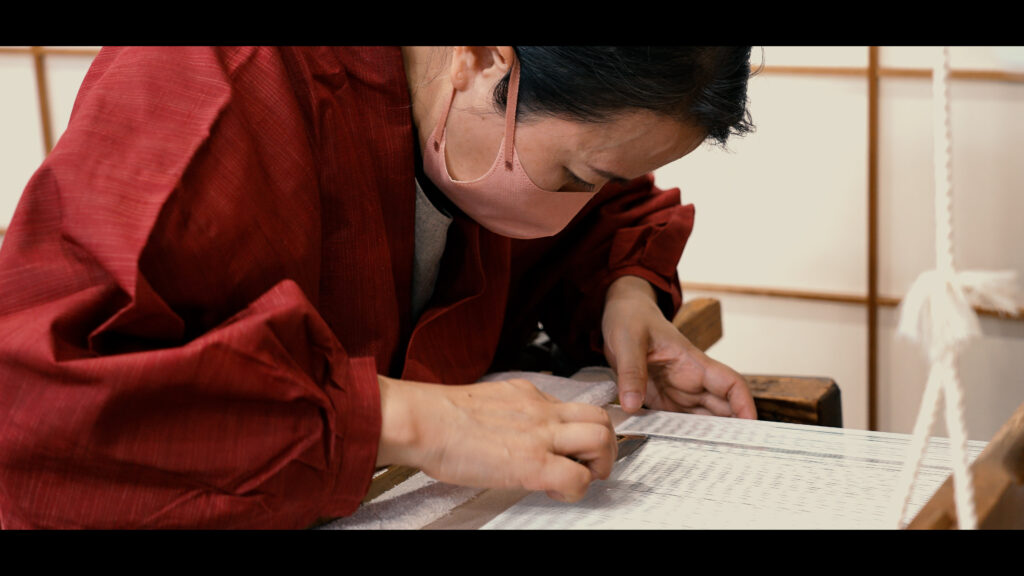
Chikako Yamagishi
[Nishijin Textile Artisan]
originally from Hiroshima Prefecture, studied Japanese painting at a junior college. After graduation, she worked at a weaving company where she learned the technique of “nail-pulling hon tsuzure” weaving for three years.
Inspired by a tsuzure weaving exhibit she saw at a show, she decided to pursue a career as a dyeing and weaving artist and returned to school for further education. After graduating, she apprenticed for three years under Shisen Kodama, a master of Nishijin weaving. Overcoming trigeminal neuralgia in her thirties, she earned the qualification of Nishijin Weaving
Traditional Craftsman.
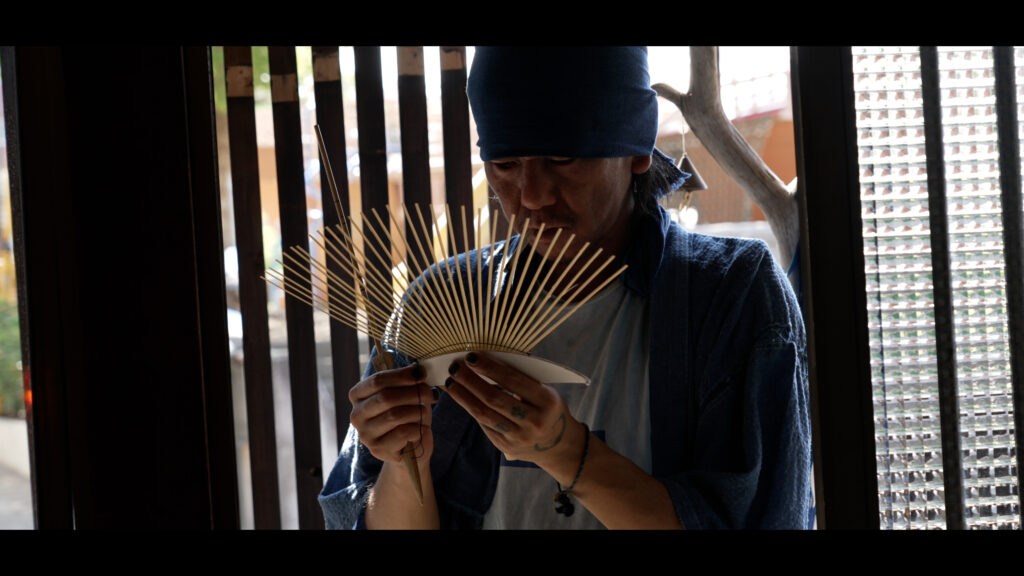
Tonbiii(Yutaka Shimizu)
[Indigo-Dyed Marugame Fan Artisan]
from Kagawa Prefecture.
After leaving his office job, he trained in Tokushima and his hometown Marugame, focusing on creating unique works
that combine authentic indigo dyeing with Marugame fans.
Alongside his craft, he also runs a guesthouse and workshop called “Hatagoya Tonbiii” (Travelers’ Inn Tonbiii).
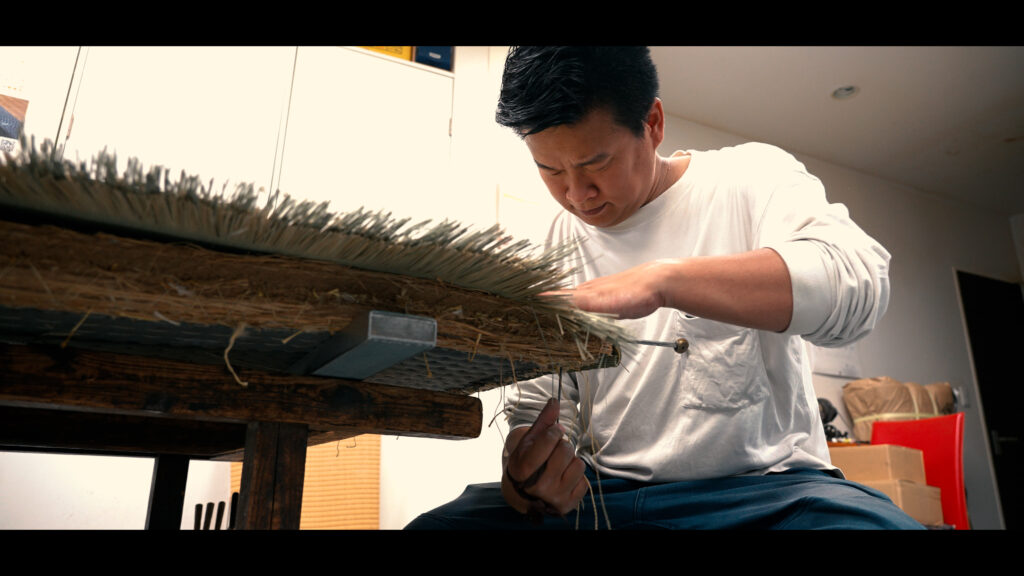
Taihei Tsunekawa
[Tatami Craftsman]
from Tokyo. He represents the sixth generation of the Takaokaya Tsunekawa Tatami Shop, which has been in operation for over 160 years. After graduating from university, he enrolled in a tatami craftsmanship training school where he obtained a national certification as a first-class tatami craftsman and a license as a tatami instructor. He succeeded his father
to continue the tradition of tatami craftsmanship. While preserving age-old techniques, he is also committed to developing new products to make tatami more accessible and familiar to the public.
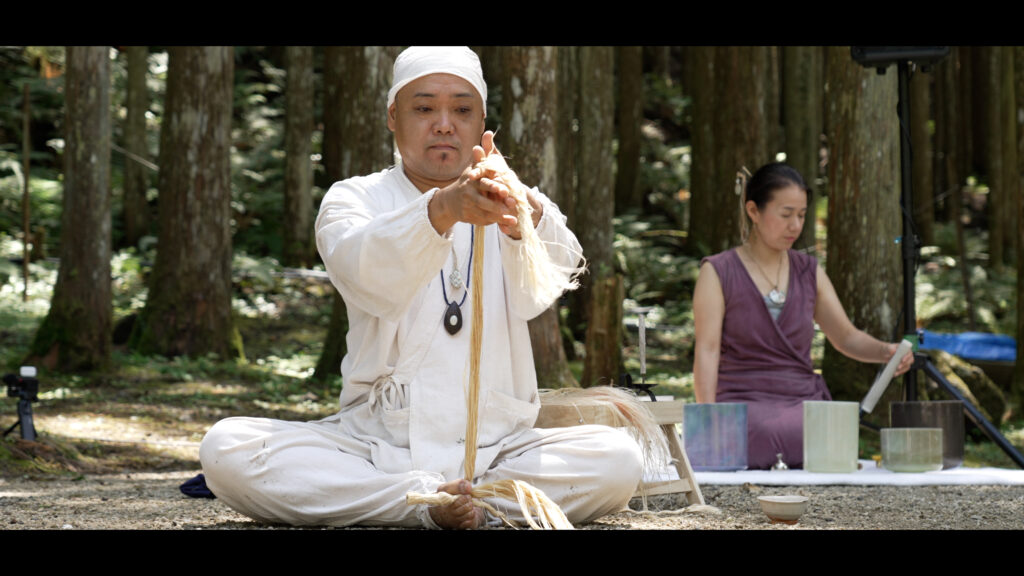
Harumitsu Takaoka
[Hemp Knot Artisan]
from Nara Prefecture.
He encountered fine hemp and creates works themed around “prayer.” He has donated shimenawa (sacred ropes) and
other works to many shrines and temples across Japan, including Miwa Za-Ebisu Shrine and Kashihara Shrine.
He holds about 60 workshops and classes annually in various locations. In 2021, he formed the art unit MuSuHi
with art director Shigeyoshi Mishima.
STAFF
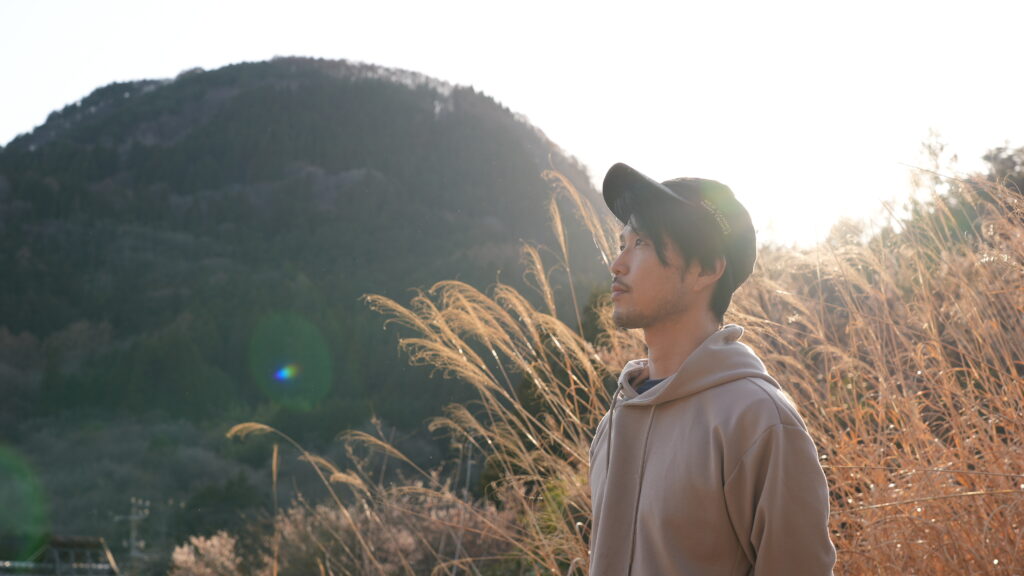
Director
Shinichi Sawada
born in Tokyo in 1983. After working in advertising and various sectors of the entertainment industry, he became independent in 2021. He founded Amenouzume Inc., a creative studio named after a goddess from Japanese mythology, with a mission to explore the realms of performance and creation.
As a director and producer, he devoted nearly four years to the making of his debut documentary film, “Hinomoto Shokuninshu: TSURUGI”, released in 2025. Centered on six Japanese artisans and their pursuit of creation through the theme of “harmony,” the film intimately follows the artisans at work—capturing the inherited techniques and spirit embedded in their craft. Through their struggles and paths of renewal, the film reflects on the essence of life as a journey of self-confrontation.
In 2024, Sawada took the stage as a speaker at TEDxKioicho, sharing his vision as a documentary art director and advocating the deeper significance of the Japanese sword. In 2025, his work was selected for the EXPO VISION program at the Osaka Expo Arena “Matsuri.”
© 2025 Amenouzume Inc.